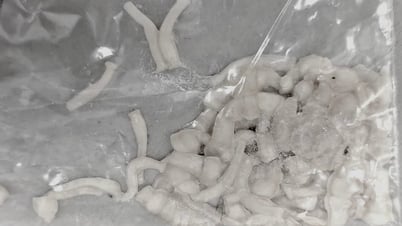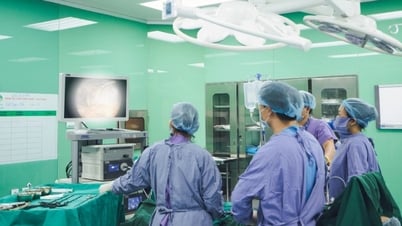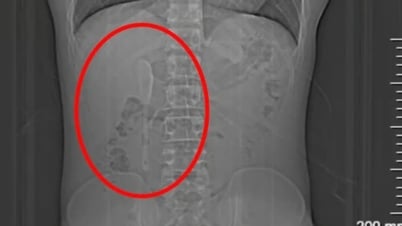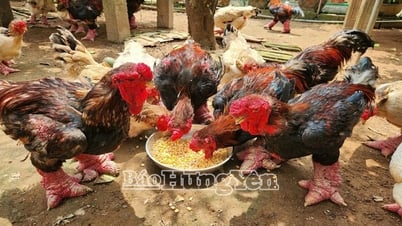Organ meats are high in fat and bad cholesterol.
Animal organs include brain, heart, liver, kidney, stomach, intestines... most of which are rich in nutrients, containing lots of protein, vitamin A, iron... However, this type of food also contains a lot of fat and bad cholesterol, causing metabolic disorders.
According to the National Institute of Nutrition, offal provides iron, which helps prevent anemia in children and pregnant women as well as women of childbearing age. These foods also provide a lot of vitamin A, which helps improve eyesight, strengthen resistance and growth in children.
However, this group should only eat offal in moderation (2-3 times/week). Each time, adults should eat 50-70g, children should only eat 30-50g.
In addition, animal organs contain a lot of cholesterol. Elderly people, people with metabolic disorders such as hypercholesterolemia, atherosclerosis, hypertension, diabetes, gout, kidney disease, overweight - obese people... should limit eating this dish.
Although it is a familiar dish to many Vietnamese people, offal can become the cause of many dangerous diseases for humans if the origin is not guaranteed and if it is not processed hygienically.
Risk of spreading bacteria from the intestines and stomach
Intestines and stomachs that are not properly prepared or cooked can spread E. coli, Salmonella, Shigella... bacteria to humans. This is the cause of digestive diseases such as diarrhea, cholera, dysentery, typhoid.
In addition, when eating undercooked organs contaminated with eggs or larvae, users can be infected with intestinal parasites such as roundworms, trichinosis, tapeworms, dog tapeworms, etc., causing damage to the brain, liver, muscles, eyes and other organs.
Bovine brains, if of unknown origin, can carry bovine spongiform encephalopathy (or mad cow disease). The disease can be transmitted to humans, causing severe neurological degeneration and even death.
Animal liver, especially beef and pork liver, if fed with moldy feed, may contain Aflatoxin - a toxin secreted by the fungus Aspergillus flavus. If accumulated in the body for a long time, this substance can cause liver cancer.
In addition, streptococcus suis can exist in the blood, intestines, organs and meat of pigs, even in healthy animals. When eating undercooked pork products such as blood pudding, nem chua, people can be infected with streptococcus. The disease can cause meningitis, pneumonia, myocarditis, arthritis, internal bleeding, and even death.
Therefore, when buying organs, people should choose fresh, elastic, smooth-surfaced foods. Do not buy foods that are yellow, dark purple, or have a foul odor. Absolutely do not eat raw or rare organs (such as blood pudding, rare boiled intestines, and fermented pork rolls).
Users should buy organs of clear origin, quarantined, preferably at supermarkets or reputable establishments.
Ingredients of some nutrients found in many organs (content in 100g of edible food)
STT | Food name | Protein (g) | Fat (g) | Cholesterol (mg) | Vitamin A (mcg) | Iron (g) |
1 | Pig brain | 9 | 9.5 | 2500 |
| 1.6 |
2 | Chicken heart | 16 | 5.5 |
|
| 5.3 |
3 | Pig heart | 15.1 | 3.2 | 140 | 8 | 5.9 |
4 | Beef heart | 15 | 3 | 150 | 6 | 5.4 |
5 | Beef liver | 17.4 | 3.1 |
| 5000 | 9 |
6 | Chicken liver | 18.2 | 3.4 | 440 | 6960 | 8.2 |
7 | Duck liver | 17.1 | 4.7 | 400 | 2960 | 4.8 |
8 | Pig liver | 18.8 | 3.6 | 300 | 6000 | 12 |
9 | Pork kidney | 13 | 3.1 | 375 | 150 | 8 |
10 | Beef kidney | 12.5 | 1.8 | 400 | 330 | 7.1 |
11 | Pork tongue | 14.2 | 12.8 |
|
| 2.4 |
Source: https://dantri.com.vn/suc-khoe/su-dung-long-lon-tiem-an-nhieu-nguy-co-suc-khoe-neu-khong-dung-cach-20250507171954200.htm


![[Photo] Standing member of the Secretariat Tran Cam Tu chaired a meeting with Party committees, offices, Party committees, agencies and Central organizations.](https://vphoto.vietnam.vn/thumb/1200x675/vietnam/resource/IMAGE/2025/7/1/b8922706fa384bbdadd4513b68879951)
































































































Comment (0)